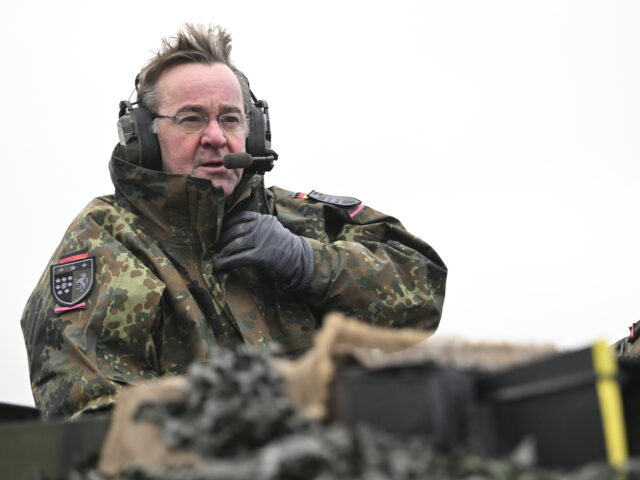Germany will increase its military aid to Ukraine by 100 per cent next year despite growing concerns in the West that the conflict has now devolved into an unwinnable situation for Kyiv.
German Defence Minister Boris Pistorius announced on Monday that Berlin will double its military aid to Ukraine in 2024 to €8 billion ($8.5 billion), public broadcaster Deutsche Welle reports.
Pistorius said that while international attention has largely shifted to the conflict between Israel and Hamas terrorists in Gaza, Germany’s increased aid to Kyiv will send a “strong signal to Ukraine, showing we are not giving up on it”.
Besides the United States, Germany is now one of the largest financial backers of Ukraine since Russia launched an invasion of the former Soviet State, having sent 22 billion euros ($23.5 billion) in humanitarian, financial and military aid since last February. The increased funding will reportedly count towards Germany’s national defence spending, thereby enabling Berlin to claim that it has finally fulfilled its NATO spending requirements, which it has seriously neglected for years.
The move comes as the West is appears to be increasingly coming to terms with the extremely slow rate of progress of Ukraine retaking the large swaths of territory seized by Russia, the return of which President Volodymyr Zelensky has demanded as a prerequisite to any peace talks with Moscow.
Last week, a report from NBC News claimed that officials in the United States have quietly begun pressuring Kyiv to begin peace negotiations with the Kremlin amid growing concerns of Ukraine’s dwindling number of soldiers and Russia’s much larger population to draft replacements.
The report went on to claim that American officials are privately viewing the conflict, which U.S. citizens have subsidised to the tune of $113 billion since last year, has devolved into a “stalemate“, with the lines along the front remaining largely static amid the much-hyped Ukrainian counteroffensive launched in July.
German People ‘Must Become Ready For War’, Warns Defence Ministerhttps://t.co/ko2yAjtIxE
— Breitbart London (@BreitbartLondon) October 31, 2023
While President Biden has been lobbying for an additional $61.4 billion in aid to Ukraine, there has been growing opposition among congressional Republicans as well as the American population as a whole to continue funding the war against Russia.
There have also been mounting concerns over the apparent rampant corruption in the former Soviet state, with reports citing Ukrainian officials claiming that people are “stealing like there’s no tomorrow” from the government.
Concerns about Ukraine’s dire situation have not only come from the United States, with Britain’s Ministry of Defence reporting earlier this month that Kyiv’s counteroffensive has “floundered” and that the conflict has deteriorated into trench warfare similar to that seen during the First World War. Ukraine’s own top general has said he has been studying First World War battles to help him better fight the “stalemate” conflict.
The decision from Berlin to double down on the war in Ukraine also follows a report from the Washington Post in conjunction with German news magazine Der Spiegel over the weekend accusing former Ukrainian Special Operations Forces officer Roman Chervinsky of being the “coordinator” of the sabotage of the Nord Stream 1 and 2 natural gas pipelines previously connecting Russia to Germany.
The bombing of the pipelines represents one of the largest economic attacks on Germany since the Second World War and would in other circumstances likely be viewed as an act of war. The sabotage has severely impacted the German economy to this day, particularly on its manufacturing base, which not only requires natural gas for energy but also as a key component of many petroleum-based products.
The severing of the main source of Russian energy to Europe’s top economy has forced Germany and others to purchase far more expensive American natural gas transported across the Atlantic Ocean. So far, Berlin has not commented on the report claiming that Ukraine’s military was behind the attack on its energy infrastructure.
Senior Ukrainian Military Officer ‘Coordinated’ Sabotage of Nord Stream Pipelines: Reporthttps://t.co/uDo0ndtBIa
— Breitbart London (@BreitbartLondon) November 12, 2023

COMMENTS
Please let us know if you're having issues with commenting.